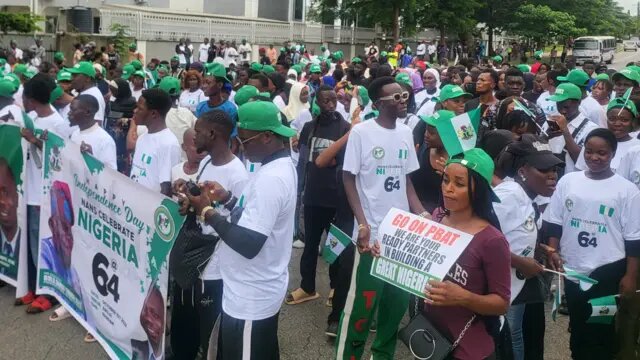On October 1, 2024, Nigerians took to the streets under the banner of FearlessInOctober, coinciding with the country’s 64th Independence Day. The protests were fueled by widespread frustrations over economic hardships and government policies perceived as detrimental to the populace.
Demonstrators gathered in major cities including Abuja, Lagos, and Kano, demanding accountability from the government for rising living costs and rampant inflation. Protesters carried placards with messages such as “We are hungry” and “Enough is Enough, highlighting their grievances against the current administration led by President Bola Tinubu
In Abuja, security forces responded to the demonstrations with tear gas and live ammunition, resulting in clashes that left several protesters injured. Eyewitnesses reported chaotic scenes as police dispersed crowds at locations like Jabi and Utako, forcing many to flee for safety. The crackdown led to multiple arrests, including five protest leaders in Kano.
Despite the heavy-handed response from authorities, peaceful protests continued in cities like Ibadan and Ondo, where demonstrators vowed to persist in their fight against what they termed “bad governance.” Omoyele Sowore, a prominent activist and former presidential candidate, addressed the crowd in Lagos, stating, “The independence that was granted in 1960 has become a burden on ordinary Nigerians. Today marks our call for real independence.
The protests are a continuation of earlier demonstrations held between August 1 and 10 under the EndBadGovernance banner. Activists have cited soaring inflation rates—reported at over 33%—and skyrocketing food prices as critical issues driving public discontent. A recent survey indicated that many Nigerian households are struggling to afford basic necessities due to the economic crisis exacerbated by recent government reforms.
Sowore emphasized that these protests aim to enforce specific demands, including a reduction in fuel prices and an end to corruption within government ranks. “Our independence starts now,” he declared, urging citizens to unite against oppressive policies that have worsened their living conditions
In response to the protests, President Tinubu acknowledged the struggles faced by Nigerians during an Independence Day address but urged patience as his administration implements reforms aimed at stabilizing the economy. However, many protesters expressed skepticism regarding the government’s commitment to addressing their concerns.
As tensions continue to rise across Nigeria, civil society organizations have pledged to sustain their efforts until their demands are met. The situation remains fluid, with activists calling for further actions if their grievances go unaddressed
The Fearless In October protests signify a critical moment in Nigeria’s political landscape as citizens demand change amidst economic turmoil. As demonstrations unfold across various states, the government’s handling of these protests will be closely monitored both domestically and internationally.
Share
Rewrite



















